韩愈-师说翻译
高中课文《师说》原文及翻译注释

高中课文《师说》原文及翻译注释高中课文《师说》原文及翻译注释_师说韩愈的《师说》以孔子的言论和实践,说明师弟关系是相对的,凡是在道与业方面胜过自己或有一技之长的人都可以为师。
下面是小编为大家整理的高中课文《师说》原文及翻译注释,希望能帮助到大家!韩愈《师说》原文古之学者必有师。
师者,所以传道受业解惑也。
人非生而知之者,孰能无惑?惑而不从师,其为惑也,终不解矣。
生乎吾前,其闻道也固先乎吾,吾从而师之师说师说;生乎吾后,其闻道也亦先乎吾,吾从而师之。
吾师道也,夫庸知其年之先后生于吾乎?是故无贵无贱,无长无少,道之所存,师之所存也。
嗟乎!师道之不传也久矣!欲人之无惑也难矣!古之圣人,其出人也远矣,犹且从师而问焉;今之众人,其下圣人也亦远矣,而耻学于师。
是故圣益圣,愚益愚。
圣人之所以为圣,愚人之所以为愚,其皆出于此乎?爱其子,择师而教之;于其身也,则耻师焉,惑矣。
彼童子之师,授之书而习其句读者,非吾所谓传其道解其惑者也。
句读之不知,惑之不解,或师焉,或不焉,小学而大遗,吾未见其明也。
巫医乐师百工之人,不耻相师。
士大夫之族,曰师曰弟子云者,则群聚而笑之。
问之,则曰:“彼与彼年相若也,道相似也,位卑则足羞,官盛则近谀。
”呜呼!师道之不复,可知矣。
巫医乐师百工之人,君子不齿,今其智乃反不能及,其可怪也欤!圣人无常师。
孔子师郯子、苌弘、师襄、老聃。
郯子之徒,其贤不及孔子。
孔子曰:“三人行,则必有我师”。
是故弟子不必不如师,师不必贤于弟子。
闻道有先后,术业有专攻,如是而已。
李氏子蟠,年十七,好古文,六艺经传皆通习之,不拘于时,学于余。
余嘉其能行古道,作《师说》以贻之。
韩愈《师说》翻译古代求学的人一定有老师。
老师是用来传授道理,讲授学业,解答疑难问题的。
人不是一生下来就懂得道理的,谁能没有疑惑?有疑惑却不求老师指教,那成为疑难的问题,终究得不到解决。
在我之前出生的人,他懂得道理本来就比我早,我跟从他,拜他为师;在我之后出生的人,他懂得道理如果也比我早,我也跟从他学习,把他当作老师,我学习的是道理,哪里去考虑他的年龄比我大还是比我小呢?因此,不论地位显贵或是低下,不论年长年少,道理存在的地方,就是老师存在的地方。
师说简短的翻译
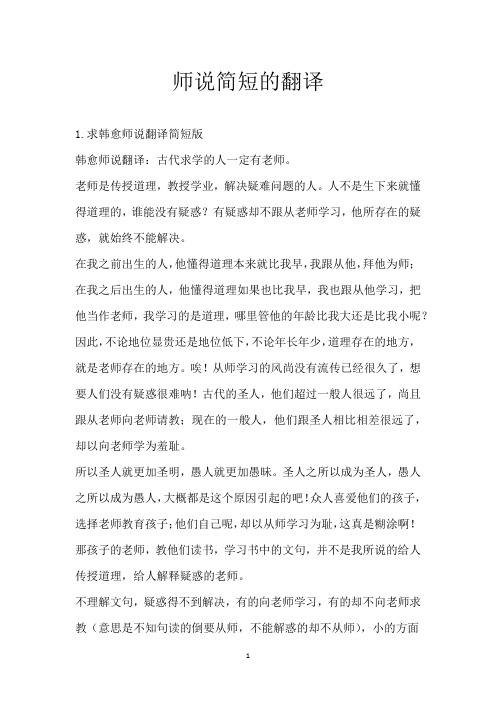
师说简短的翻译1.求韩愈师说翻译简短版韩愈师说翻译:古代求学的人一定有老师。
老师是传授道理,教授学业,解决疑难问题的人。
人不是生下来就懂得道理的,谁能没有疑惑?有疑惑却不跟从老师学习,他所存在的疑惑,就始终不能解决。
在我之前出生的人,他懂得道理本来就比我早,我跟从他,拜他为师;在我之后出生的人,他懂得道理如果也比我早,我也跟从他学习,把他当作老师,我学习的是道理,哪里管他的年龄比我大还是比我小呢?因此,不论地位显贵还是地位低下,不论年长年少,道理存在的地方,就是老师存在的地方。
唉!从师学习的风尚没有流传已经很久了,想要人们没有疑惑很难呐!古代的圣人,他们超过一般人很远了,尚且跟从老师向老师请教;现在的一般人,他们跟圣人相比相差很远了,却以向老师学为羞耻。
所以圣人就更加圣明,愚人就更加愚昧。
圣人之所以成为圣人,愚人之所以成为愚人,大概都是这个原因引起的吧!众人喜爱他们的孩子,选择老师教育孩子;他们自己呢,却以从师学习为耻,这真是糊涂啊!那孩子的老师,教他们读书,学习书中的文句,并不是我所说的给人传授道理,给人解释疑惑的老师。
不理解文句,疑惑得不到解决,有的向老师学习,有的却不向老师求教(意思是不知句读的倒要从师,不能解惑的却不从师),小的方面学习,大的方面却放弃了,我看不出他们有什么明智的呢。
医生,乐师及各种工匠,不以互相学习为耻。
士大夫这类人中,如有人称人家为老师,称自己为学生,这些人就聚集在一起嘲笑他。
问那些嘲笑者(嘲笑他的原因),他们就说:"那个人与某人年龄相近,修养和学业也差不多,(怎么能称他为老师呢?)以地位低的人为师,足以感到羞愧,称官位高的人为师就近于谄媚。
"啊!从师学习的风尚不能恢复,由此就可以知道了。
医生、乐师及各种工匠,士大夫之类的人是不屑与他们为伍的,现在士大夫们的智慧反而不如他们。
难道值得奇怪吗?圣人没有固定的老师,孔子曾经以郯子、苌弘、师襄、老聃为师。
韩愈《师说》原文注音翻译

韩愈《师说》原文注音翻译韩愈《师说》原文注音翻译_师说《师说》这篇文章中列举正反面的事例层层对比,反复论证,论述了从师表学习的必要性和原则,批判了当时社会上“耻学于师”的陋习。
下面是小编为大家整理的韩愈《师说》原文注音翻译,希望能帮助到大家!韩愈《师说》原文古之学者必有师。
师者,所以传道受业解惑也。
人非生而知之者,孰能无惑?惑而不从师,其为惑也,终不解矣。
生乎吾前,其闻道也固先乎吾,吾从而师之;生乎吾后,其闻道也亦先乎吾,吾从而师之。
吾师道也,夫庸知其年之先后生于吾乎?是故无贵无贱,无长无少,道之所存,师之所存也。
嗟(jiē)乎!师道之不传也久矣!欲人之无惑也难矣!古之圣人,其出人也远矣,犹且从师而问焉;今之众人,其下圣人也亦远矣,而耻学于师。
是故圣益圣,愚益愚。
圣人之所以为圣,愚人之所以为愚,其皆出于此乎!爱其子,择师而教之;于其身也,则耻师焉,惑矣。
彼童子之师,授之书而习其句读(dòu)者,非吾所谓传其道解其惑者也。
句读之不知,惑之不解,或师焉,或不(fǒu)焉,小学而大遗,吾未见其明也。
巫医乐师百工之人,不耻相师。
士大夫之族,曰师曰弟子云者,则群聚而笑之。
问之,则曰:“彼与彼年相若也,道相似也。
位卑则足羞,官盛则近谀。
”呜呼!师道之不复,可知矣。
巫医乐师百工之人,君子不齿,今其智乃反不能及,其可怪也欤!圣人无常师。
孔子师郯子(tán)、苌弘、师襄、老聃(dān)。
郯子之徒,其贤不及孔子。
孔子曰:三人行,则必有我师。
是故弟子不必不如师,师不必贤于弟子,闻道有先后,术业有专攻,如是而已。
李氏子蟠,年十七,好古文,六艺经传皆通习之,不拘于时,学于余。
余嘉其能行古道,作《师说》以贻之。
韩愈《师说》翻译古代求学的人一定有老师。
老师是用来传授道理,讲授学业,解答疑难问题的。
人不是一生下来就懂得道理的,谁能没有疑惑?有疑惑却不求老师指教,那成为疑难的问题,终究得不到解决。
在我之前出生的人,他懂得道理本来就比我早,我跟从他,拜他为师;在我之后出生的人,他懂得道理如果也比我早,我也跟从他学习,把他当作老师,我学习的是道理,哪里去考虑他的年龄比我大还是比我小呢?因此,不论地位显贵或是低下,不论年长年少,道理存在的地方,就是老师存在的地方。
高中语文文言文韩愈《师说》原文与译文

韩愈《师说》原文与译文【原文】古之学者必有师。
师者,所以传道受业解惑也。
人非生而知之者,孰能无惑?惑而不从师,其为惑也,终不解矣。
生乎吾前,其闻道也固先乎吾,吾从而师之;生乎吾后,其闻道也亦先乎吾,吾从而师之。
吾师道也,夫庸知其年之先后生于吾乎?是故无贵无贱,无长无少,道之所存,师之所存也。
嗟乎!师道之不传也久矣!欲人之无惑也难矣!古之圣人,其出人也远矣,犹且从师而问焉;今之众人,其下圣人也亦远矣,而耻学于师。
是故圣益圣,愚益愚。
圣人之所以为圣,愚人之所以为愚,其皆出于此乎?爱其子,择师而教之;于其身也,则耻师焉,惑矣。
彼童子之师,授之书而习其句读者,非吾所谓传其道解其惑者也。
句读之不知,惑之不解,或师焉,或不焉,小学而大遗,吾未见其明也。
巫医乐师百工之人,不耻相师。
士大夫之族,曰师曰弟子云者,则群聚而笑之。
问之,则曰:“彼与彼年相若也,道相似也。
位卑则足羞,官盛则近谀。
”呜呼!师道之不复,可知矣。
巫医乐师百工之人,君子不齿,今其智乃反不能及,其可怪也欤!圣人无常师。
孔子师郯子、苌弘、师襄、老聃。
郯子之徒,其贤不及孔子。
孔子曰:“三人行,则必有我师。
”是故弟子不必不如师,师不必贤于弟子,闻道有先后,术业有专攻,如是而已。
李氏子蟠,年十七,好古文,六艺经传皆通习之,不拘于时,学于余。
余嘉其能行古道,作《师说》以贻之。
【译文】古代求学的人必定有老师。
老师,是用来传授道理、讲授学业、解答疑难问题的。
人不是一生下来就懂得道理的,谁能没有疑惑?有了疑惑,如果不跟老师学习,那些成为疑难的问题,就始终不能解开。
出生在我之前的人,他懂得的道理本来就比我早,我跟从他,拜他为老师;出生在我之后的人,如果他懂得道理也比我早,我也跟从他,拜他为老师。
我是向他学习道理的,哪管他的年龄比我大还是小呢?因此,无论高低贵贱,无论年长年幼,道理存在的地方,就是老师所在的地方。
唉!古代从师学习的风尚不流传已经很久了,要人没有疑惑也难了!古代的圣人,超出一般人很远,尚且要跟从老师请教(他,焉为代词);现在的一般人,才智不及圣人也很远,却以向老师学习为耻。
3.3《师说》原文、注释、翻译
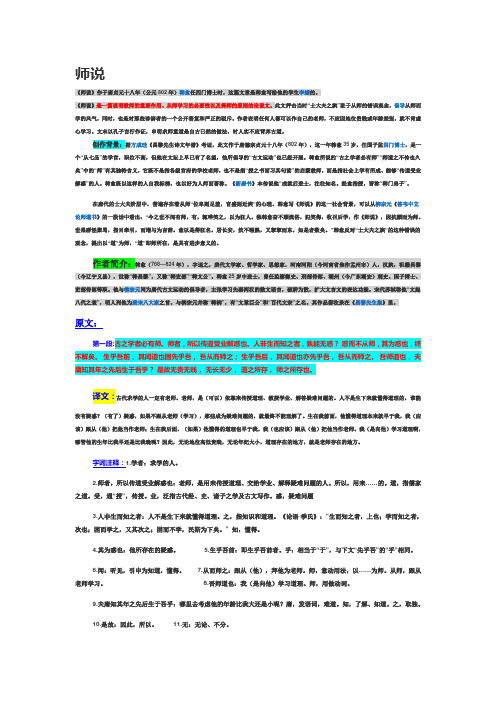
师说《师说》作于唐贞元十八年(公元802年)韩愈任四门博士时,这篇文章是韩愈写给他的学生李蟠的。
《师说》是一篇说明教师的重要作用、从师学习的必要性以及择师的原则的论说文。
此文抨击当时“士大夫之族”耻于从师的错误观念,倡导从师而学的风气,同时,也是对那些诽谤者的一个公开答复和严正的驳斥。
作者表明任何人都可以作自己的老师,不应因地位贵贱或年龄差别,就不肯虚心学习。
文末以孔子言行作证,申明求师重道是自古已然的做法,时人实不应背弃古道。
创作背景:据方成珪《昌黎先生诗文年谱》考证,此文作于唐德宗贞元十八年(802年),这一年韩愈35岁,任国子监四门博士,是一个“从七品”的学官,职位不高,但他在文坛上早已有了名望,他所倡导的“古文运动”也已经开展。
韩愈所说的“古之学者必有师”“师道之不传也久矣”中的“师”有其独特含义,它既不是指各级官府的学校老师,也不是指“授之书而习其句读”的启蒙教师,而是指社会上学有所成、能够“传道受业解惑”的人。
韩愈既以这样的人自我标榜,也以好为人师而著称。
《新唐书》本传说他“成就后进士,往往知名。
经愈指授,皆称“韩门弟子”。
在唐代的士大夫阶层中,普遍存在着从师“位卑则足羞,官盛则近谀”的心理。
韩愈写《师说》的这一社会背景,可以从柳宗元《答韦中立论师道书》的一段话中看出:“今之世不闻有师,有,辄哗笑之,以为狂人。
独韩愈奋不顾流俗,犯笑侮,收召后学,作《师说》,因抗颜而为师。
世果群怪聚骂,指目牵引,而增与为言辞。
愈以是得狂名。
居长安,炊不暇熟,又挈挈而东,如是者数矣。
”韩愈反对“士大夫之族”的这种错误的观念,提出以“道”为师,“道”即师所在,是具有进步意义的。
作者简介:韩愈(768—824年),字退之,唐代文学家、哲学家、思想家,河南河阳(今河南省焦作孟州市)人,汉族,祖籍昌黎(今辽宁义县),世称“韩昌黎”,又称“韩吏部”“韩文公”。
韩愈25岁中进士,曾任监察御史、刑部侍郎、潮州(今广东潮安)刺史、国子博士、吏部侍郎等职。
高中语文文言文韩愈《师说》原文、译文
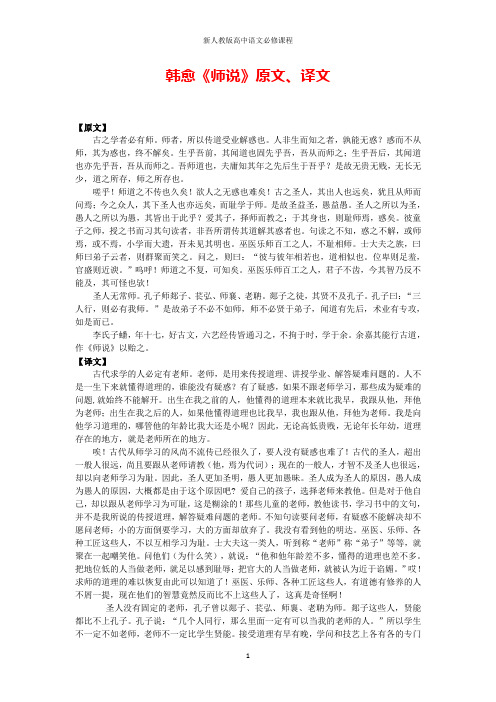
韩愈《师说》原文、译文【原文】古之学者必有师。
师者,所以传道受业解惑也。
人非生而知之者,孰能无惑?惑而不从师,其为惑也,终不解矣。
生乎吾前,其闻道也固先乎吾,吾从而师之;生乎吾后,其闻道也亦先乎吾,吾从而师之。
吾师道也,夫庸知其年之先后生于吾乎?是故无贵无贱,无长无少,道之所存,师之所存也。
嗟乎!师道之不传也久矣!欲人之无惑也难矣!古之圣人,其出人也远矣,犹且从师而问焉;今之众人,其下圣人也亦远矣,而耻学于师。
是故圣益圣,愚益愚。
圣人之所以为圣,愚人之所以为愚,其皆出于此乎?爱其子,择师而教之;于其身也,则耻师焉,惑矣。
彼童子之师,授之书而习其句读者,非吾所谓传其道解其惑者也。
句读之不知,惑之不解,或师焉,或不焉,小学而大遗,吾未见其明也。
巫医乐师百工之人,不耻相师。
士大夫之族,曰师曰弟子云者,则群聚而笑之。
问之,则曰:“彼与彼年相若也,道相似也。
位卑则足羞,官盛则近谀。
”呜呼!师道之不复,可知矣。
巫医乐师百工之人,君子不齿,今其智乃反不能及,其可怪也欤!圣人无常师。
孔子师郯子、苌弘、师襄、老聃。
郯子之徒,其贤不及孔子。
孔子曰:“三人行,则必有我师。
”是故弟子不必不如师,师不必贤于弟子,闻道有先后,术业有专攻,如是而已。
李氏子蟠,年十七,好古文,六艺经传皆通习之,不拘于时,学于余。
余嘉其能行古道,作《师说》以贻之。
【译文】古代求学的人必定有老师。
老师,是用来传授道理、讲授学业、解答疑难问题的。
人不是一生下来就懂得道理的,谁能没有疑惑?有了疑惑,如果不跟老师学习,那些成为疑难的问题,就始终不能解开。
出生在我之前的人,他懂得的道理本来就比我早,我跟从他,拜他为老师;出生在我之后的人,如果他懂得道理也比我早,我也跟从他,拜他为老师。
我是向他学习道理的,哪管他的年龄比我大还是小呢?因此,无论高低贵贱,无论年长年幼,道理存在的地方,就是老师所在的地方。
唉!古代从师学习的风尚不流传已经很久了,要人没有疑惑也难了!古代的圣人,超出一般人很远,尚且要跟从老师请教(他,焉为代词);现在的一般人,才智不及圣人也很远,却以向老师学习为耻。
《师说》文言文原文及翻译
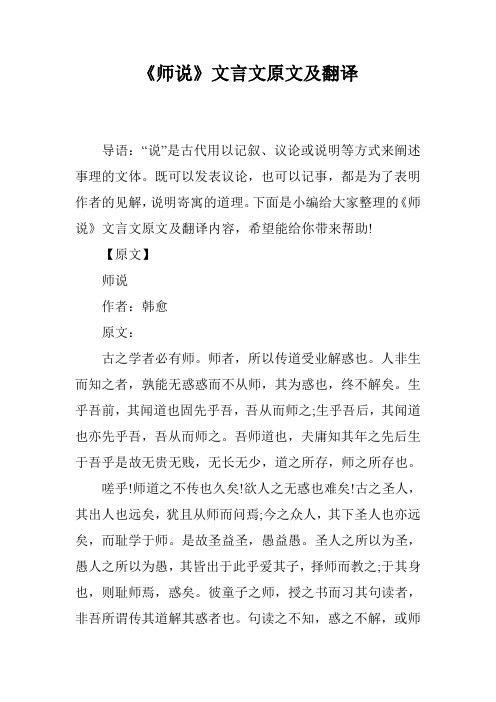
《师说》文言文原文及翻译导语:“说”是古代用以记叙、议论或说明等方式来阐述事理的文体。
既可以发表议论,也可以记事,都是为了表明作者的见解,说明寄寓的道理。
下面是小编给大家整理的《师说》文言文原文及翻译内容,希望能给你带来帮助!【原文】师说作者:韩愈原文:古之学者必有师。
师者,所以传道受业解惑也。
人非生而知之者,孰能无惑惑而不从师,其为惑也,终不解矣。
生乎吾前,其闻道也固先乎吾,吾从而师之;生乎吾后,其闻道也亦先乎吾,吾从而师之。
吾师道也,夫庸知其年之先后生于吾乎是故无贵无贱,无长无少,道之所存,师之所存也。
嗟乎!师道之不传也久矣!欲人之无惑也难矣!古之圣人,其出人也远矣,犹且从师而问焉;今之众人,其下圣人也亦远矣,而耻学于师。
是故圣益圣,愚益愚。
圣人之所以为圣,愚人之所以为愚,其皆出于此乎爱其子,择师而教之;于其身也,则耻师焉,惑矣。
彼童子之师,授之书而习其句读者,非吾所谓传其道解其惑者也。
句读之不知,惑之不解,或师焉,或不焉,小学而大遗,吾未见其明也。
巫医乐师百工之人,不耻相师。
士大夫之族,曰师曰弟子云者,则群聚而笑之。
问之,则曰:“彼与彼年相若也,道相似也。
位卑则足羞,官盛则近谀。
”呜呼!师道之不复可知矣。
巫医乐师百工之人,君子不齿,今其智乃反不能及,其可怪也欤!圣人无常师。
孔子师郯子、苌弘、师襄、老聃。
郯子之徒,其贤不及孔子。
孔子曰:“三人行,则必有我师。
”是故弟子不必不如师,师不必贤于弟子,闻道有先后,术业有专攻,如是而已。
李氏子蟠,年十七,好古文,六艺经传皆通习之,不拘于时,学于余。
余嘉其能行古道,作《师说》以贻之。
【作品介绍】:《师说》是韩愈的一篇著名论文。
据方成珪《昌黎先生诗文年谱》考证,此文作于唐德宗贞元十八年(802),这一年,韩愈35岁,任国子监四门博士,这是一个“从七品”的学官,职位不高,但是他在文坛上早已有了名望,他所倡导的“古文运动”也已经开展,他是这个运动公认的领袖。
《师说》原文及翻译
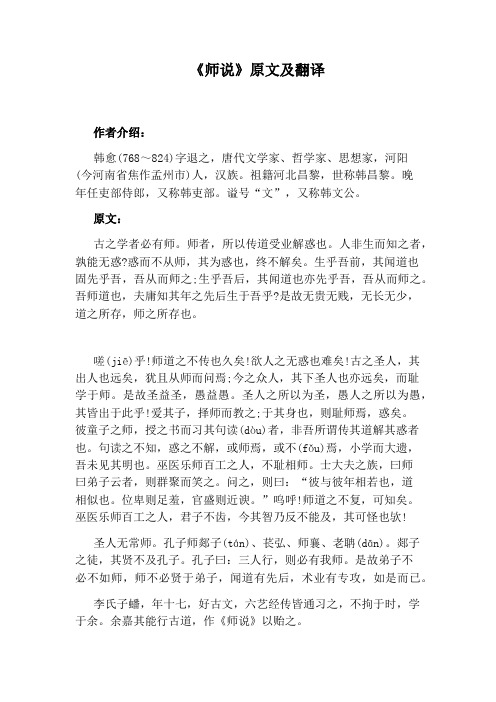
《师说》原文及翻译作者介绍:韩愈(768~824)字退之,唐代文学家、哲学家、思想家,河阳(今河南省焦作孟州市)人,汉族。
祖籍河北昌黎,世称韩昌黎。
晚年任吏部侍郎,又称韩吏部。
谥号“文”,又称韩文公。
原文:古之学者必有师。
师者,所以传道受业解惑也。
人非生而知之者,孰能无惑?惑而不从师,其为惑也,终不解矣。
生乎吾前,其闻道也固先乎吾,吾从而师之;生乎吾后,其闻道也亦先乎吾,吾从而师之。
吾师道也,夫庸知其年之先后生于吾乎?是故无贵无贱,无长无少,道之所存,师之所存也。
嗟(jiē)乎!师道之不传也久矣!欲人之无惑也难矣!古之圣人,其出人也远矣,犹且从师而问焉;今之众人,其下圣人也亦远矣,而耻学于师。
是故圣益圣,愚益愚。
圣人之所以为圣,愚人之所以为愚,其皆出于此乎!爱其子,择师而教之;于其身也,则耻师焉,惑矣。
彼童子之师,授之书而习其句读(dòu)者,非吾所谓传其道解其惑者也。
句读之不知,惑之不解,或师焉,或不(fǒu)焉,小学而大遗,吾未见其明也。
巫医乐师百工之人,不耻相师。
士大夫之族,曰师曰弟子云者,则群聚而笑之。
问之,则曰:“彼与彼年相若也,道相似也。
位卑则足羞,官盛则近谀。
”呜呼!师道之不复,可知矣。
巫医乐师百工之人,君子不齿,今其智乃反不能及,其可怪也欤!圣人无常师。
孔子师郯子(tán)、苌弘、师襄、老聃(dān)。
郯子之徒,其贤不及孔子。
孔子曰:三人行,则必有我师。
是故弟子不必不如师,师不必贤于弟子,闻道有先后,术业有专攻,如是而已。
李氏子蟠,年十七,好古文,六艺经传皆通习之,不拘于时,学于余。
余嘉其能行古道,作《师说》以贻之。
字词解释:[1]学者:求学的人。
[2]道:指儒家孔子、孟轲的哲学、政治等原理、原则。
可以参看本书上面所选韩愈《原道》。
[3]受:通“授”。
传授。
[4]业:泛指古代经、史、诸子之学及古文写作,可以参看本书下面所选韩愈《进学解》中所述作者治学内容。
[5]人非生而知之者:人不是生下来就懂得道理。
《师说》原文及翻译

《师说》唐.韩愈一、本篇原文:古之学者必有师。
师者,所以传道受业解惑也。
人非生而知之者,孰能无惑?惑而不从师,其为惑也,终不解矣。
生乎吾前,其闻道也固先乎吾,吾从而师之;生乎吾后,其闻道也亦先乎吾,吾从而师之。
吾师道也,夫庸知其年之先后生于吾乎?是故无贵无贱,无长无少,道之所存,师之所存也。
嗟乎!师道之不传也久矣!欲人之无惑也难矣!古之圣人,其出人也远矣,犹且从师而问焉;今之众人,其下圣人也亦远矣,而耻学于师。
是故圣益圣,愚益愚。
圣人之所以为圣,愚人之所以为愚,其皆出于此乎?爱其子,择师而教之;于其身也,则耻师焉,惑矣。
彼童子之师,授之书而习其句读者,非吾所谓传其道解其惑者也。
句读之不知,惑之不解,或师焉,或不焉,小学而大遗,吾未见其明也。
巫医乐师百工之人,不耻相师。
士大夫之族,曰师曰弟子云者,则群聚而笑之。
问之,则曰:“彼与彼年相若也,道相似也。
位卑则足羞,官盛则近谀。
”呜呼!师道之不复可知矣。
巫医乐师百工之人,君子不齿,今其智乃反不能及,其可怪也欤!圣人无常师。
孔子师郯子、苌弘、师襄、老聃。
郯子之徒,其贤不及孔子。
孔子曰:三人行,则必有我师。
是故弟子不必不如师,师不必贤于弟子,闻道有先后,术业有专攻,如是而已。
李氏子蟠,年十七,好古文,六艺经传皆通习之,不拘于时,学于余。
余嘉其能行古道,作《师说》以贻之。
二、文章翻译:《师说》的白话文翻译如下:古代学习的人一定都有老师。
老师的作用是来传授道理、教授学业、解答疑难问题。
人不是生来就知道一切的,谁能没有疑惑呢?如果有了疑惑却不去向老师学习,那么这些疑惑就永远不会得到解决。
那些比我早出生的人,他们比我早听到道理,我应该向他们学习;那些比我晚出生的人,他们听到的道理也比我早,我也应该向他们学习。
我是向道理学习,哪里还会去计较他们的年龄是比我大还是比我小呢?因此,不论贵贱、不论老少,道理存在的地方,老师也就在那里。
唉!师道的传承已经中断很久了,想要人们没有疑惑是多么困难啊!古代的圣人,他们超出常人很远,尚且要向老师请教;现在的普通人,他们比圣人差得更远,却以向老师学习为耻。
师说原文和翻译

关于师说原文和翻译《师说》作于唐贞元十八年(公元802年)韩愈任四门博士时,是说明教师的重要作用,从师学习的必要性以及择师的原则。
下面我们来看看关于师说原文和翻译,欢迎阅读借鉴。
【原文】古之学者必有师。
师者,所以传道受业解惑也。
人非生而知之者,孰能无惑?惑而不从师,其为惑也,终不解矣。
生乎吾前,其闻道也固先乎吾,吾从而师之;生乎吾后,其闻道也亦先乎吾,吾从而师之。
吾师道也,夫庸知其年之先后生于吾乎?是故无贵无贱,无长无少,道之所存,师之所存也。
嗟乎!师道之不传也久矣!欲人之无惑也难矣!古之圣人,其出人也远矣,犹且从师而问焉;今之众人,其下圣人也亦远矣,而耻学于师。
是故圣益圣,愚益愚。
圣人之所以为圣,愚人之所以为愚,其皆出于此乎?爱其子,择师而教之;于其身也,则耻师焉,惑矣。
彼童子之师,授之书而习其句读者,非吾所谓传其道解其惑者也。
句读之不知,惑之不解,或师焉,或不焉,小学而大遗,吾未见其明也。
巫医乐师百工之人,不耻相师。
士大夫之族,曰师曰弟子云者,则群聚而笑之。
问之,则曰:“彼与彼年相若也,道相似也。
位卑则足羞,官盛则近谀。
”呜呼!师道之不复,可知矣。
巫医乐师百工之人,君子不齿,今其智乃反不能及,其可怪也欤!圣人无常师。
孔子师郯子、苌弘、师襄、老聃。
郯子之徒,其贤不及孔子。
孔子曰:“三人行,则必有我师。
”是故弟子不必不如师,师不必贤于弟子,闻道有先后,术业有专攻,如是而已。
李氏子蟠,年十七,好古文,六艺经传皆通习之,不拘于时,学于余。
余嘉其能行古道,作《师说》以贻之。
【译文】唉!古代从师学习的风尚不流传已非常久了,要人没有疑惑也难了!古代的圣人,超出一般人非常远,尚且要跟从老师请教(他,焉为代词);现在的一般人,才智不及圣人也非常远,却以向老师学习为耻。
所以,圣人更加圣明,愚人更加愚昧。
圣人成为圣人的原因,愚人成为愚人的原因,大概都是由于这个原因吧? 爱自己的孩子,选择老师来教他。
但对于他自己,却以跟从老师学习为可耻,这是很糊涂的!那些儿童的老师,教他读书,学习书中的文句,并不是我所说的传授道理,解答疑难问题的老师。
《师说》文言文翻译

《师说》文言文翻译(附鉴赏+教学设计)韩愈,字退之,世称“韩昌黎”(祖籍河北昌黎),与柳宗元倡导“古文运动”。
又称“韩吏部”(晚年担任吏部侍郎)又称“韩文公”(谥号“文”)。
明人列他为:唐宋八大家之首。
接下来小编为你带来《师说》文言文翻译,希望对你有帮助。
(点击对应目录可以直接查阅哦!)▼目录▼【2】译文及注释【7】作品、作者简介【3】创作背景【8】教学设计【4】作品鉴赏【9】教学反思【5】写法总述【10】读后感《师说》原文古之学者必有师。
师者,所以传道受业解惑也。
人非生而知之者,孰能无惑?惑而不从师,其为惑也,终不解矣。
生乎吾前,其闻道也固先乎吾,吾从而师之;生乎吾后,其闻道也亦先乎吾,吾从而师之。
吾师道也,夫庸知其年之先后生于吾乎?是故无贵无贱,无长无少,道之所存,师之所存也。
嗟乎!师道之不传也久矣!欲人之无惑也难矣!古之圣人,其出人也远矣,犹且从师而问焉;今之众人,其下圣人也亦远矣,而耻学于师。
是故圣益圣,愚益愚。
圣人之所以为圣,愚人之所以为愚,其皆出于此乎?爱其子,择师而教之;于其身也,则耻师焉,惑矣。
彼童子之师,授之书而习其句读者也,非吾所谓传其道解其惑者也。
句读之不知,惑之不解,或师焉,或不焉,小学而大遗,吾未见其明也。
巫医乐师百工之人,不耻相师。
士大夫之族,曰师曰弟子云者,则群聚而笑之。
问之,则曰:彼与彼年相若也,道相似也,位卑则足羞,官盛则近谀。
呜呼!师道之不复,可知矣。
巫医乐师百工之人,君子不齿,今其智乃反不能及,其可怪也欤!圣人无常师。
孔子师郯子、苌弘、师襄、老聃。
郯子之徒,其贤不及孔子。
孔子曰:三人行,则必有我师。
是故弟子不必不如师,师不必贤于弟子,闻道有先后,术业有专攻,如是而已。
李氏子蟠年十七,好古文,六艺经传皆通习之,不拘于时,学于余。
余嘉其能行古道,作《师说》以贻之。
译文及注释译文古时候求学的人必定有好老师。
好老师,(是)靠(他)来传授道理,讲授学业,解答疑难问题的人啊。
韩愈《师说》原文及其英文翻译
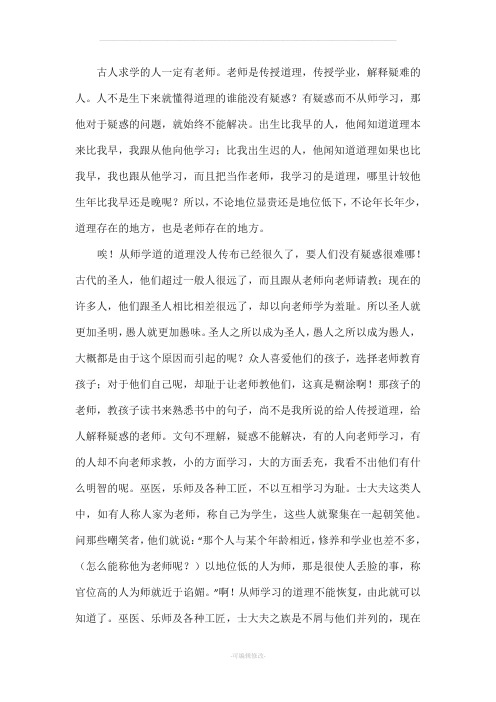
古人求学的人一定有老师。
老师是传授道理,传授学业,解释疑难的人。
人不是生下来就懂得道理的谁能没有疑惑?有疑惑而不从师学习,那他对于疑惑的问题,就始终不能解决。
出生比我早的人,他闻知道道理本来比我早,我跟从他向他学习;比我出生迟的人,他闻知道道理如果也比我早,我也跟从他学习,而且把当作老师,我学习的是道理,哪里计较他生年比我早还是晚呢?所以,不论地位显贵还是地位低下,不论年长年少,道理存在的地方,也是老师存在的地方。
唉!从师学道的道理没人传布已经很久了,要人们没有疑惑很难哪!古代的圣人,他们超过一般人很远了,而且跟从老师向老师请教;现在的许多人,他们跟圣人相比相差很远了,却以向老师学为羞耻。
所以圣人就更加圣明,愚人就更加愚味。
圣人之所以成为圣人,愚人之所以成为愚人,大概都是由于这个原因而引起的呢?众人喜爱他们的孩子,选择老师教育孩子;对于他们自己呢,却耻于让老师教他们,这真是糊涂啊!那孩子的老师,教孩子读书来熟悉书中的句子,尚不是我所说的给人传授道理,给人解释疑惑的老师。
文句不理解,疑惑不能解决,有的人向老师学习,有的人却不向老师求教,小的方面学习,大的方面丢充,我看不出他们有什么明智的呢。
巫医,乐师及各种工匠,不以互相学习为耻。
士大夫这类人中,如有人称人家为老师,称自己为学生,这些人就聚集在一起朝笑他。
问那些嘲笑者,他们就说:“那个人与某个年龄相近,修养和学业也差不多,(怎么能称他为老师呢?)以地位低的人为师,那是很使人丢脸的事,称官位高的人为师就近于谄媚。
”啊!从师学习的道理不能恢复,由此就可以知道了。
巫医、乐师及各种工匠,士大夫之族是不屑与他们并列的,现在士大夫们的智慧反而赶不上他们。
这不是很奇怪的事么!圣人没有固定的老师,孔子曾以郯子、苌弘、师襄、老聘为师。
郯子这一类人,他们的品德才能当然赶不上孔子。
孔子说:“几个人走在一起,其中就一定有我的老师。
”所以学生不一定不如老师,老师也不一定比学生强,知道道理有先有后,技能学业各有专门研究,如此而已。
唐韩愈《师说》翻译及赏析

唐韩愈《师说》翻译及赏析原文:师说唐·韩愈古之学者必有师。
师者,所以传道受业解惑也。
人非生而知之者,孰能无惑?惑而不从师,其为惑也,终不解矣。
生乎吾前,其闻道也固先乎吾,吾从而师之;生乎吾后,其闻道也亦先乎吾,吾从而师之。
吾师道也,夫庸知其年之先后生于吾乎?是故无贵无贱,无长无少,道之所存,师之所存也。
嗟乎! 师道之不传也久矣! 欲人之无惑也难矣! 古之圣人,其出人也远矣,犹且从师而问焉;今之众人,其下圣人也亦远矣,而耻学于师。
是故圣益圣,愚益愚。
圣人之所以为圣,愚人之所以为愚,其皆出于此乎?爱其子,择师而教之;于其身也,则耻师焉,惑矣。
彼童子之师,授之书而习其句读者,非吾所谓传其道解其惑者也。
句读之不知,惑之不解,或师焉,或不焉,小学而大遗,吾未见其明也。
巫医乐师百工之人,不耻相师。
士大夫之族,曰师曰弟子云者,则群聚而笑之。
问之,则曰:“彼与彼年相若也,道相似也。
位卑则足羞,官盛则近谀。
” 呜呼! 师道之不复可知矣。
巫医乐师百工之人,君子不齿,今其智乃反不能及,其可怪也欤!圣人无常师。
孔子师郯子、苌弘、师襄、老聃。
郯子之徒,其贤不及孔子。
孔子曰:三人行,则必有我师。
是故弟子不必不如师,师不必贤于弟子,闻道有先后,术业有专攻,如是而已。
李氏子蟠,年十七,好古文,六艺经传皆通习之,不拘于时,学于余。
余嘉其能行古道,作《师说》以贻之。
翻译:古代求学的人一定有老师。
老师,是可以依靠来传授道理、教授学业、解答疑难问题的。
人不是生下来就懂得道理的,谁能没有疑惑?有了疑惑,如果不跟从老师学习,那些成为疑难问题的,就最终不能理解了。
生在我前面,他懂得道理本来就早于我,我应该跟从他把他当作老师;生在我后面,如果他懂得的道理也早于我,我也应该跟从他把他当作老师。
我是向他学习道理啊,哪管他的生年比我早还是比我晚呢?因此,无论地位高低贵贱,无论年纪大小,道理存在的地方,就是老师存在的地方。
唉,古代从师学习的风尚不流传已经很久了,想要人没有疑惑难啊!古代的圣人,他们超出一般人很远,尚且跟从老师而请教;现在的一般人,他们的才智低于圣人很远,却以向老师学习为耻。
《师说》文言文原文与翻译通用6篇

《师说》文言文原文与翻译通用6篇篇一:原文篇一作者:韩愈古之学者必有师。
师者,所以传道受业解惑也。
人非生而知之者,孰能无惑?惑而不从师,其为惑也,终不解矣。
生乎吾前,其闻道也固先乎吾,吾从而师之;生乎吾后,其闻道也亦先乎吾,吾从而师之。
吾师道也,夫庸知其年之先后生于吾乎?是故无贵无贱,无长无少,道之所存,师之所存也。
嗟(jiē)乎!师道之不传也久矣!欲人之无惑也难矣!古之圣人,其出人也远矣,犹且从师而问焉;今之众人,其下圣人也亦远矣,而耻学于师。
是故圣益圣,愚益愚。
圣人之所以为圣,愚人之所以为愚,其皆出于此乎!爱其子,择师而教之;于其身也,则耻师焉,惑矣。
彼童子之师,授之书而习其句读(dòu)者,非吾所谓传其道解其惑者也。
句读之不知,惑之不解,或师焉,或不(fǒu)焉,小学而大遗,吾未见其明也。
巫医乐师百工之人,不耻相师。
士大夫之族,曰师曰弟子云者,则群聚而笑之。
问之,则曰:“彼与彼年相若也,道相像也。
位卑则足羞,官盛则近谀。
”呜呼!师道之不复,可知矣。
巫医乐师百工之人,君子不齿,今其智乃反不能及,其可怪也欤!圣人无常师。
孔子师郯子(tán)、苌弘、师襄、老聃(dān)。
郯子之徒,其贤不及孔子。
孔子曰:三人行,则必有我师。
是故弟子不必不如师,师不必贤于弟子,闻道有先后,术业有专攻,如是而已。
李氏子蟠,年十七,好古文,六艺经传皆通习之,不拘于时,学于余。
余嘉其能行古道,作以贻之。
篇二:写作背景篇二作者表明任何人都可以做自己的老师,不应因地位贵贱或年龄差别,就不愿虚心学习。
文末并以孔子言行作证,申明求师重道是自古已然的做法,时人实不应背弃古道。
这是韩愈散文中一篇重要的论说文。
文章论述了从师表学习的必要性和原则,批判了当时社会上“耻学于师”的陋俗,表现出非凡的志气和斗争精神,也表现出作者不顾世俗独抒己见的精神。
中国古代的学校教化非常发达,从中心到地方都有官学。
韩愈写这篇文章时三十五岁,正在国子监任教。
师说原文及翻译韩愈全文译文

师说唐韩愈古之学者必有师。
师者,所以传道受业解惑也。
人非生而知之者,孰能无惑?惑而不从师,其为惑也,终不解矣。
生乎吾前,其闻道也固先乎吾,吾从而师之;生乎吾后,其闻道也亦先乎吾,吾从而师之。
吾师道也,夫庸知其年之先后生于吾乎?是故无贵无贱,无长无少,道之所存,师之所存也。
嗟乎!师道之不传也久矣!欲人之无惑也难矣!古之圣人,其出人也远矣,犹且从师而问焉;今之众人,其下圣人也亦远矣,而耻学于师。
是故圣益圣,愚益愚。
圣人之所以为圣,愚人之所以为愚,其皆出于此乎?爱其子,择师而教之;于其身也,则耻师焉,惑矣。
彼童子之师,授之书而习其句读者,非吾所谓传其道解其惑者也。
句读之不知,惑之不解,或师焉,或不焉,小学而大遗,吾未见其明也。
巫医乐师百工之人,不耻相师。
士大夫之族,曰师曰弟子云者,则群聚而笑之。
问之,则曰:“彼与彼年相若也,道相似也。
位卑则足羞,官盛则近谀。
”呜呼!师道之不复可知矣。
巫医乐师百工之人,君子不齿,今其智乃反不能及,其可怪也欤!圣人无常师。
孔子师郯子、苌弘、师襄、老聃。
郯子之徒,其贤不及孔子。
孔子曰:三人行,则必有我师。
是故弟子不必不如师,师不必贤于弟子,闻道有先后,术业有专攻,如是而已。
李氏子蟠,年十七,好古文,六艺经传皆通习之,不拘于时,学于余。
余嘉其能行古道,作《师说》以贻之。
译文:古代求学的人必定有老师。
老师,是用来传授道、教授学业、解释疑难问题的人。
人不是一生下来就懂得知识和道理,谁能没有疑惑?有了疑惑,如果不跟老师学习,那些成为困惑的问题,就始终不能解开。
生在我前面,他懂得道理本来就早于我,我(应该)跟从(他)把他当作老师;生在我后面,(如果)他懂得的道理也早于我,我(也应该)跟从(他)把他当作老师。
从师的传统,哪里去考虑他的年龄比我大还是小呢?因此,无论地位高低贵贱,无论年纪大小,道理存在的地方,就是老师存在的地方。
唉!(古代)从师(学习)的风尚不流传已经很久了!想要人没有疑惑难啊!古代的圣人,他们超出一般人很远,尚且跟从老师而请教;现在的一般人,他们(的才智)低于圣人很远,却以向老师学习为耻。
韩愈师说原文及翻译
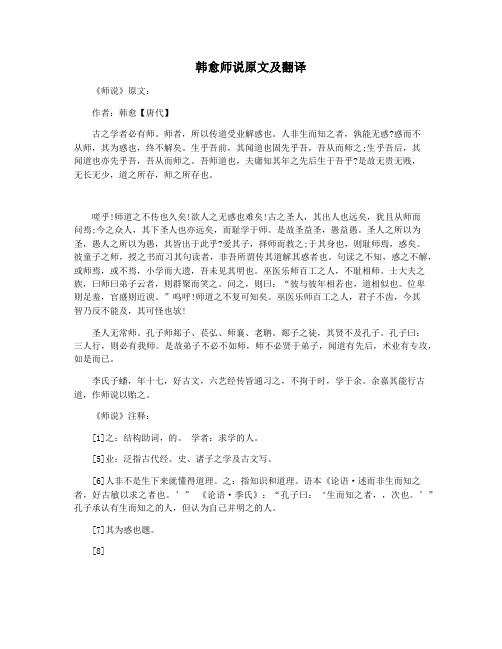
韩愈师说原文及翻译《师说》原文:作者:韩愈【唐代】古之学者必有师。
师者,所以传道受业解惑也。
人非生而知之者,孰能无惑?惑而不从师,其为惑也,终不解矣。
生乎吾前,其闻道也固先乎吾,吾从而师之;生乎吾后,其闻道也亦先乎吾,吾从而师之。
吾师道也,夫庸知其年之先后生于吾乎?是故无贵无贱,无长无少,道之所存,师之所存也。
嗟乎!师道之不传也久矣!欲人之无惑也难矣!古之圣人,其出人也远矣,犹且从师而问焉;今之众人,其下圣人也亦远矣,而耻学于师。
是故圣益圣,愚益愚。
圣人之所以为圣,愚人之所以为愚,其皆出于此乎?爱其子,择师而教之;于其身也,则耻师焉,惑矣。
彼童子之师,授之书而习其句读者,非吾所谓传其道解其惑者也。
句读之不知,惑之不解,或师焉,或不焉,小学而大遗,吾未见其明也。
巫医乐师百工之人,不耻相师。
士大夫之族,曰师曰弟子云者,则群聚而笑之。
问之,则曰:“彼与彼年相若也,道相似也。
位卑则足羞,官盛则近谀。
”呜呼!师道之不复可知矣。
巫医乐师百工之人,君子不齿,今其智乃反不能及,其可怪也欤!圣人无常师。
孔子师郯子、苌弘、师襄、老聃。
郯子之徒,其贤不及孔子。
孔子曰:三人行,则必有我师。
是故弟子不必不如师,师不必贤于弟子,闻道有先后,术业有专攻,如是而已。
李氏子蟠,年十七,好古文,六艺经传皆通习之,不拘于时,学于余。
余嘉其能行古道,作师说以贻之。
《师说》注释:[1]之:结构助词,的。
学者:求学的人。
[5]业:泛指古代经、史、诸子之学及古文写。
[6]人非不是生下来就懂得道理。
之:指知识和道理。
语本《论语·述而非生而知之者,好古敏以求之者也。
’” 《论语·季氏》:“孔子曰:‘生而知之者,,次也。
’”孔子承认有生而知之的人,但认为自己并明之的人。
[7]其为惑也题。
[8][9]闻道:语本《论语·里仁闻道,夕死可矣。
’”闻,听见,引伸为懂得。
道:儒家之道。
[10]从而师之:跟从他并。
师,意动用法,以...为师[11]夫庸知其年之先后生于吾着知道我早还是比我晚呢?庸,岂,难道。
韩愈《师说》原文及翻译

韩愈《师说》原⽂及翻译 你读过《师说》这篇⽂章吗?它是唐代诗⼈韩愈的作品。
以下是店铺为⼤家整理的“韩愈《师说》原⽂及翻译”,仅供参考,欢迎⼤家阅读!韩愈《师说》原⽂及翻译 《师说》原⽂: 作者:韩愈【唐代】 古之学者必有师。
师者,所以传道受业解惑也。
⼈⾮⽣⽽知之者,孰能⽆惑?惑⽽不从师,其为惑也,终不解矣。
⽣乎吾前,其闻道也固先乎吾,吾从⽽师之;⽣乎吾后,其闻道也亦先乎吾,吾从⽽师之。
吾师道也,夫庸知其年之先后⽣于吾乎?是故⽆贵⽆贱,⽆长⽆少,道之所存,师之所存也。
嗟乎!师道之不传也久矣!欲⼈之⽆惑也难矣!古之圣⼈,其出⼈也远矣,犹且从师⽽问焉;今之众⼈,其下圣⼈也亦远矣,⽽耻学于师。
是故圣益圣,愚益愚。
圣⼈之所以为圣,愚⼈之所以为愚,其皆出于此乎?爱其⼦,择师⽽教之;于其⾝也,则耻师焉,惑矣。
彼童⼦之师,授之书⽽习其句读者,⾮吾所谓传其道解其惑者也。
句读之不知,惑之不解,或师焉,或不焉,⼩学⽽⼤遗,吾未见其明也。
巫医乐师百⼯之⼈,不耻相师。
⼠⼤夫之族,⽈师⽈弟⼦云者,则群聚⽽笑之。
问之,则⽈:“彼与彼年相若也,道相似也。
位卑则⾜羞,官盛则近谀。
”呜呼!师道之不复可知矣。
巫医乐师百⼯之⼈,君⼦不齿,今其智乃反不能及,其可怪也欤! 圣⼈⽆常师。
孔⼦师郯⼦、苌弘、师襄、⽼聃。
郯⼦之徒,其贤不及孔⼦。
孔⼦⽈:三⼈⾏,则必有我师。
是故弟⼦不必不如师,师不必贤于弟⼦,闻道有先后,术业有专攻,如是⽽已。
李⽒⼦蟠,年⼗七,好古⽂,六艺经传皆通习之,不拘于时,学于余。
余嘉其能⾏古道,作师说以贻之。
《师说》注释: [1]之:结构助词,的。
学者:求学的⼈。
[5]业:泛指古代经、史、诸⼦之学及古⽂写。
[6]⼈⾮不是⽣下来就懂得道理。
之:指知识和道理。
语本《论语·述⽽⾮⽣⽽知之者,好古敏以求之者也。
’” 《论语·季⽒》:“孔⼦⽈:‘⽣⽽知之者,,次也。
’”孔⼦承认有⽣⽽知之的⼈,但认为⾃⼰并明之的⼈。
师说逐字逐句翻译

《师说》是唐朝韩愈的著作。
译文如下:古代求学的人必定有老师。
老师,是用来传授道、教授学业、解释疑难问题的人。
人不是一生下来就懂得知识和道理,谁能没有疑惑?有了疑惑,如果不跟老师学习,那些成为困惑的问题,就始终不能解开。
生在我前面,他懂得道理本来就早于我,我(应该)跟从(他)把他当作老师;生在我后面,(如果)他懂得的道理也早于我,我(也应该)跟从(他)把他当作老师。
从师的传统,哪里去考虑他的年龄比我大还是小呢?因此,无论地位高低贵贱,无论年纪大小,道理存在的地方,就是老师存在的地方。
唉!(古代)从师(学习)的风尚不流传已经很久了!想要人没有疑惑难啊!古代的圣人,他们超出一般人很远,尚且跟从老师而请教;现在的一般人,他们(的才智)低于圣人很远,却以向老师学习为耻。
因此圣人就更加圣明,愚人就更加愚昧。
圣人之所以能成为圣人,愚人之所以能成为愚人,大概都出于这吧?(人们)爱他们的孩子,就选择老师来教他;(但是)对于他自己呢,却以跟从老师(学习)为可耻,真是糊涂啊。
那些孩子们的老师,是教他们读书,(帮助他们)学习断句的,不是我所说的能传授那些道理,解答那些疑难问题的。
不知句子(如何)停顿,向老师请教,有的(疑惑)却不向老师学习,小的方面倒要学习,大的方面反而放弃(不学),我没看出那种人是明智的。
巫医乐师和各种工匠这些人,不以互相学习为耻。
士大夫这类人,(听到)称“老师”称“弟子”的,就成群聚在一起讥笑人家。
问他们(为什么讥笑),就说:“他和他年龄差不多,道德学问也差不多,(以)地位低(的人为师),就觉得羞耻,(以)官职高(的人为师),就近乎谄媚了。
”唉!(古代那种)跟从老师学习的风尚不能恢复,(从这些话里就)可以明白了。
巫医乐师和各种工匠这些人,君子们不屑一提,现在他们的见识竟反而赶不上(这些人),真是令人奇怪啊!圣人没有固定的老师。
孔子曾师从郯子、苌弘、师襄、老聃。
郯子这些人,他们的贤能都比不上孔子。
孔子说:几个人一起走,(其中)一定有(可以当)我的老师(的人)。
- 1、下载文档前请自行甄别文档内容的完整性,平台不提供额外的编辑、内容补充、找答案等附加服务。
- 2、"仅部分预览"的文档,不可在线预览部分如存在完整性等问题,可反馈申请退款(可完整预览的文档不适用该条件!)。
- 3、如文档侵犯您的权益,请联系客服反馈,我们会尽快为您处理(人工客服工作时间:9:00-18:30)。
韩愈·《师说》英译古之学者必有师。
师者,所以传道受业解惑也。
人非生而知之者,孰能无惑?惑而不从师,其为惑也,终不解矣。
生乎吾前,其闻道也,固先乎吾,吾从而师之;生乎吾后,其闻道也,亦先乎吾,吾从而师之。
吾师道也,夫庸知其年之先后生于吾乎?是故无贵无贱,无长无少,道之所存,师之所存也。
嗟乎!师道之不传也久矣,欲人之无惑也难矣。
古之圣人,其出人也远矣,犹且从师而问焉;今之众人,其下圣人也亦远矣,而耻学于师。
是故圣益圣,愚益愚。
圣人之所以为圣,愚人之所以为愚,其皆出于此乎?爱其子,择师而教之;于其身也,则耻师焉,惑矣。
彼童子之师,授之书而习其句读者,非吾所谓传其道解其惑者也。
句读之不知,惑之不解,或师焉,或不焉,小学而大遗,吾未见其明也。
巫医、乐师、百工之人,不耻相师。
士大夫之族,曰师曰弟子云者,则群聚而笑之。
问之,则曰:“彼与彼年相若也,道相似也,位卑则足羞,官盛则近谀。
”呜呼!师道之不复,可知矣。
巫医、乐师、百工之人,君子不齿。
今其智乃反不能及,其可怪也欤!圣人无常师。
孔子师郯子、苌弘、师襄、老聃。
郯子之徒,其贤不及孔子。
孔子曰:“三人行,则必有我师。
”是故弟子不必不如师,师不必贤于弟子。
闻道有先后,术业有专攻,如是而已。
李氏子蟠,年十七,好古文,六艺经传皆通习之,不拘于时,学于余。
余嘉其能行古道,作《师说》以贻之。
On the TeacherHan YuIn ancient times scholars always had teachers. It takes a teacher to transmit the Way, impart knowledge and resolve doubts. Since man is not born with knowledge, who can be without doubt? But doubt will never be resolved without a teacher. He who was born before me learned the Way before me, and I take him as my teacher. But if he who was born after me learned the Way before me, I also take him as my teacher. I take the Way as my teacher. Why should I care whether a man was born before or after me? Irrespective therefore of the distinction between the high-born and the lowly, and between age and youth, where the Way is, there is my teacher.Alas, it has been a long time since the Way of the teacher was transmitted! And so it is difficult to expect people to be without doubt. Though ancient sages far surpassed the common folk, they nevertheless asked questions of their teachers. On the other hand, the masses of today, who are far inferior to the sages, are ashamed to learn from their teachers. Consequently, the sage became more sage, and the ignorant more ignorant. Indeed, is this not the reason why the sages were sage and the ignorant folk ignorant?He who loves his son selects a teacher for the child‗s education, but he is ashamed to learn from a teacher himself. He is indeed deluded. The teacher of a child is one who gives instruction on books and on the punctuation of sentences. This is not what I meant when I talked about one who transmits the Way and resolves doubts. To take a teacher for instruction in correct punctuation and not to take a teacher to help resolve doubts is to learn the unimportant and leave out the important. I do not see the wisdom of it. Shamans, doctors, musicians and craftsmen are not ashamed to take one another as teachers. But, when the scholar-officials speak of teachers and pupils, there are those who get together and laugh at them. When questioned, their reply is that so and so is of the same age as so and so and that their understanding of the Way is similar. If one takes another who holds a low position as his teacher, it is something to be ashamed of. If it is some high official who is taken as a teacher, it is a form of flattery. Alas, the Way of the teacher is no longer understood! Shamans, doctors, musicians and craftsmen are not respected by a gentleman, but their wisdom is beyond that of the gentleman. Is this not strange?Our sages had no constant teachers. Confuc ius took T‘an-tzu, Ch‘ang-hung, Shih-hsiang and Lao-tan as his teachers, all of whom were not so wise as himself. Said Confucius, ―Among three men who walk with me, there must be a teacher of mine‖. The pupil is therefore not necessarily inferior to the teacher, and the teacher is not necessarily wiser than the pupil. What makes the difference is that one has heard the Way before the other and that one is more specialized in his craft and trade than the other – that is all.Li P‘an, who is seventeen, is fo nd of ancient literature and is deeply versed in the six arts, the classics and chronicles. Not subject to the trend of the day, he has studied under me. Pleased that he can practice the ancient Way, I have written this essay on the teacher to present to him.(刘师舜译)Han YuSince ancient times, to learn all men must have teachers, who pass on the truth and dispel ignorance. As men are not born wise, who can be free from ignorance? But ignorant men do not find teachers, they remain ignorant forever. Some teachers may be born before me and have learned the truth before me; I should therefore learn from them. Some may have been born after me, but learned the truth before me; I should also learn from them. As I seek the truth, I need not worry whether my teacher is my senior or junior. Whether he is noble or common, older or younger, whoever knows the truth can be a teacher.Alas, since men have long ceased learning from teachers it is hard not to be ignorant. The old sages were far superior to common men, yet they sought the truth from teachers. Most men of today are far below those sages, yet they think it shameful to learn. That is why sages become more sage, while fools more foolish. No doubt this is what makes some sages and others fools.A man who loves his son chooses a teacher for him but is ashamed to find one for himself. This is entirely wrong. All a child's teacher can do is give him a book and tell him how to read it sentence by sentence. This is not the teacher I have in mind who can pass on the truth and dispel ignorance. If we want to learn to read but not to dispel ignorance, we are learning the lesser and giving up the greater, which is hardly intelligent.Physicians, musicians and artisans are not ashamed to learn from each other. But if one of the literati calls another man his teacher and himself pupil, people will flock to laugh at him. If you ask why, they will reply that the men are roughly equal in age and understanding. If one has a low social status, it is humiliating; if one is a high official, it looks like flattery. Clearly, to learn from a teacher is old-fashioned. Physicians, musicians and artisans are despised by gentlemen, yet they seem to be more intelligent. Is this not strange?A sage has more than one teacher. Thus Confucius learned from Tan Zi, Chang Hong, Shi Xiang and Lao Dan. Men like Tan Zi were inferior to Confucius, yet Confucius said, ―Out of three men, there must be one who can teach me.‖ So pupils are not necessarily inferior to their teachers, nor teachers better than their pupils. Some learn the truth earlier than others, and some have special skills – that is all.Li Pan, seventeen, is fond of ancient literature, and has studied the six arts, the classics and the commentaries, not confining himself to what is in vogue today. He has studied with me, and as I admire his respect for the old traditions I am writing this essay on teachers for him.(杨宪益、戴乃迭译)Han YuIn ancient times those who wanted to learn would seek out a teacher, one who could propagate the doctrine1, impart professional knowledge, and resolve doubts. Since no one is born omniscient, who can claim to have no doubts? If one has doubts and is not willing to learn from a teacher, his doubts will never be resolved. Anyone who was born before me and learned the doctrine before me is my teacher. Anyone who was born after me and learned the doctrine before me is also my teacher. Since what I desire to learn is the doctrine, why should I care whether he was born before or after me? Therefore, it does not matter whether a person is high or low in position, young or old in age. Where there is the doctrine, there is my teacher.Alas! The tradition of learning from the teacher has long been neglected. Thus it is difficult to find a person without any doubts at all. Ancient sages, who far surpassed us, even learned from their teachers. People today, who are far inferior to them, regard learning from the teacher as a disgrace. Thus, wise men become more wise and unlearned men become more foolish. This explains what makes a wise man and what makes a foolish man. It is absurd that a person would choose a teacher for his son out of his love for him, and yet refuse to learn from the teacher himself, thinking it a disgrace to do so. The teacher of his son teaches the child only reading and punctuation, which is not propagating the doctrine or resolving doubts as the aforementioned. I don‘t think it wise to learn from the teacher when one doesn‘t know how to punctuate, but not when one has doubts unresolved, for that I find to be the folly of learning in small matters, but neglecting the big ones. Even medicine men, musicians and handicraftsmen do not think it disgraceful to learn from each other. When one of the literati calls another man his ―teacher‖ and himself his ―student‖ people will get together and invariably laugh at him. If you ask them why they are laughing, they will say that since he is almost of the same age and as erudite as another man, it would be degrading for him to call the other man ―teacher‖ if the other man‘s social rank is lower than his; and it would be flattering if the other man‘s social rank is higher. Alas! It is clear that the tradition of learning from the teacher can no longer be restored. Medicine men, musicians and handicraftsmen are despised by the gentlemen. How strange it is that gentlemen are less wise than these people!The ancient sages did not limit themselves to particular teachers. Confucius had learned from people like Tanzi2, Changhong3, Shixiang4, and Laodan5, who were not as virtuous and talented as Confucius. Confucius said ―If three men are walking together, one of them is bound to be good enough to be my teacher.‖ A student is not necessarily inferior to his teacher, nor does a te acher necessarily be more virtuous and talented than his student. The real fact is that one might have learned the doctrine earlier than the other, or might be a master in his own special field.Pan, the son of Li‘s family, who is only seventeen years ol d, loves to study Chinese classics of the Qin and Han dynasties, and masters the six classics6 and their annotations. He does not follow conventions and is willing to learn from me. I appreciate his ability to act in accordance with the old tradition of learning. Therefore I dedicate this piece to him.1. The ―doctrine‖ refers chiefly to Confucius‘ teachings.2. Tanzi was the king of the State of Tan during the Spring and Autumn Period. Confucius learned from him about the titles of officials.3. Changhong was an official during the reign of Emperor Jing of the Zhou Dynasty. Confucius learned from him about music.4. Shixiang was an official of music in the State of Lu. Confucius learned from him how to play qin.5. Laodan was another name for Laotse. Confucius learned from him about the rites.6. The six classics are six classical works of Confucian teachings.(罗经国译)On TeachersHah YuAncient scholars certainly had teachers. A teacher is one who passes on the truth, imparts knowledge and solves puzzles. Man is not born with knowledge. Who can deny that he has puzzles? These would remain unsolved, should one refuse to be instructed by teachers.The men born before me surely know the truth before me, so I respect them as teachers, whereas those born after me may also know the truth before me, I likewise respect them as teachers. It is the truth that I endeavour to learn. Must I know beforehand whether my teacher was born earlier or later than I? Therefore, no distinction should be made between the noble and the humble or between the young and the old. Where lies the truth, there is a teacher.Alas, it is a long time since the admirable tone of respecting teachers ceased to pass on! How hard it would be to expect a man to be free of puzzle! Sages in olden times outstripped by far the ordinary people. Nevertheless, they had teachers and asked them questions. Nowadays the multitude, though much inferior to sages, are ashamed of being instructed by teachers. As a consequence, sages become more sage, and ignoramuses more ignorant. The wisdom of the former and the stupidity of the latter – are they not all caused by this?Loving parents may select teachers to instruct their children. But when it comes to themselves, they feel it a disgrace to be taught by them. How wrong they must be! The teachers of their children only show them how to read a book sentence by sentence, not to be mentioned in the same breath as those whom I refer to as passing on the truth and solving puzzles. For lack of reading skills, one seeks the help of teachers, while for unsolved puzzles, one acts contrariwise. It is indeed learning the lesser but giving up the greater. I do not see its wisdom.Physicians, musicians and multifarious artisans are not ashamed of learning from each other. But among the gentlefolk the talk about the teachers and pupils would invite laughter from a gathered company. When asked about the reason, they would say, ―The one is equal to the other in age and knowledge.‖ To be instructed by a man of low social standing is regarded as a disgrace, and by a man of high official rank as a flattery. Alas, it is only conceivable that the noble tone of respecting teachers is lost and hardly retrievable! Physicians, musicians and artisans are refused to be treated as equals by gentlefolks, yet these turn out to be less intelligent than those. Is it not strange?Sages have had no constant teachers. Confucius once learned from Tan Zi as well as from Chang Hong, Shi Xiang and Laozi, though Tan Zi and his like are not on a parity with him in wisdom. Confucius says: ―Out of my two fellow-travellers one must be qualified to be my teacher.‖ Hence pupils are not necessarily inferior to teachers, and teachers need not always be superior to pupils. Some may know the truth earlier or later than others and each has his own professional specialty – that is all!Li Pan, aged seventeen, is fond of ancient classical writings and have studied all the six arts and their commentaries. Not restrained by the current practice, he has learned from me. As I commend him for his being able to follow the old ways, I am writing this essay ―On Teachers‖ for him.(谢百魁译)On TeachersHan YuIn ancient times, all men who wanted to learn had teachers. A teacher is someone who deciphers truths, teaches skills, and clarifies misconceptions. Because no man is born cognizant, he must have misconceptions. If one his misconceptions, but never finds a teacher to clarify them, they will remain as misconceptions.Anyone born before me naturally knows truths before I do, and I acknowledge them as my teacher. Anyone who is born after me but knows truths before I do, I also acknowledge him as my teacher. Because what I acknowledge is his knowledge of truths, no age factor is relevant. Therefore, where there is knowledge of truths, there is a teacher, in which no factor of nobility or ignobility, seniority or lack of seniority is involved.However, this teacher-and-student tradition has long been broken. As a result, it is very hard nowadays to find people with no misconceptions. Ancient sages were far more intelligent than common people were, but those sages had teachers to consult. While today‘s masses are far more unintelligent than ancient sages were, these massages are ashamed to learn from teachers. That is why sages are sager while ignoramuses are more ignorant. And that explains why sages are sages while ignoramuses are ignoramuses.You love your children, and so you hire teachers for them, but you are ashamed to find teachers f or yourself. This is a misconception itself! Your children‘s teachers teach them how to read. What they teach is not what I mean by deciphering truths and clarifying misconceptions. When one does not know how to read, he consults teachers, but when one has misconceptions, he does not. This is to learn the trivial while neglecting the significant. I don‘t see cleverness in this.Physicians, musicians and artisans are not ashamed to seek teachers from each other to learn, but scholar-bureaucrats, on the contrary, would gather to laugh at those who talk about doing so. When asked why they laugh, they say, ―He is about the same age as his teacher. Or he has about the same knowledge as his teacher.‖ To them, it is shameful to have a teacher of lower social rank but an honor to fawn on a teacher of higher social status. Alas! This shows how impossible it is to restore the teacher-and-student tradition. Those scholar-bureaucrats are no match for those physicians, musicians or artisans whose intelligence they disdain. This is indeed ridiculous!A sage is not bound to one teacher. Confucius once learned from Tanzi, Changhong, Shixiang and Laodan, although he was not inferior to any of them. This is exactly like what he once described: ―Of the tow walking with me, one can be my teacher.‖ Therefore, a student does not necessarily have to be inferior to his teacher and a teacher does not have to be superior to his student, as knowledge can be learnt earlier or later and skills can be focused on different among people. That‘s all there is to it.Pan, the son of the Li family, age 17, who is fond of classic Chinese and has perused the Six Classics, is not influenced by the current social tendency but has come to seek my education. To glorify his spirit in carrying forward the tradition, I am writing this prose, On Teachers, for him.(徐英才译)On TeachersAncient scholars had to have teachers, who would pass on the Tao, teach them a profession, and dispel their ignorance. As men are not born wise, who can be free from ignorance? If men, being ignorant, do not seek after teachers, they will certainly remain ignorant for ever. Those who were born before me certainly have learned the Tao before me; I should therefor learn from them as my teachers. Those who were born after me may have learned the Tao before me; I should also learn from them as my teachers. As I learn the Tao, I need not ask whether my teacher is my senior or junior. Whether he is noble or common, older or younger, whoever knows the Tao can be a teacher.Ah! Since men have long ceased learning from teachers, it is hard to expect them not to be ignorant. The ancient sages were far superior to common men, but they still sought learning from teachers. Men of today are far inferior to those sages, but they think it shameful to learn from teachers. This is why sages become more sage, while fools become more foolish. Is this the reason why some become sages and others fools? A man who loves his son selects a teacher for him, but considers it shamefu l to find one for himself. He is indeed ignorant. If a child‘s teacher merely gives him a book and tells him how to read it, this is not the teacher I have in mind who passes on the Tao and dispels ignorance. If one learns from a teacher merely to read but not to dispel one‘s ignorance, one learns the lesser and gives up the greater; I do not think that such a man is intelligent. Sorcerers, physicians, musicians, and artisans are not ashamed to learn from their teachers. If men of the intelligent class appl y to themselves the expression of ―teacher‖ and ―pupil,‖ people will flock to laugh at them. If they are asked why, they will reply that these men are equal in age as well as in the Tao. If their teacher is of a lower rank, they are considered to be disgraced; if their teacher is of high position, they are considered to be flattering him. Ah! That the way of learning from a teacher cannot be recovered is now self-evident. Sorcerers, physicians, musicians, and artisans are usually despised by gentlemen, but the intelligence of the latter cannot be up to that of the former; is this not strange?A sage has no constant teacher. Thus Confucius learned from teachers such as Yen Tzu, Chang Hung, Shih Hsiang, and Lao Tan, who were inferior to Confucius. Confucius s aid, ―When walking in a party of three, there must be one who can teach me.‖ Therefore, pupils are not necessarily inferior to their teachers, nor are teachers necessarily better than their pupils. Some learn the Tao earlier than others, and some have special skills and others not—that is all.Pan, son of the Li family, seventeen years old, is fond of ancient literature and is well versed in the six arts, the classics and commentaries, not confining himself to what is in vogue at present. He comes to study with me. As I praise him for carrying out the ancient Tao, I am writing this essay on teachers for him.(Ch‘u Chai and Winberg Chai译)。
